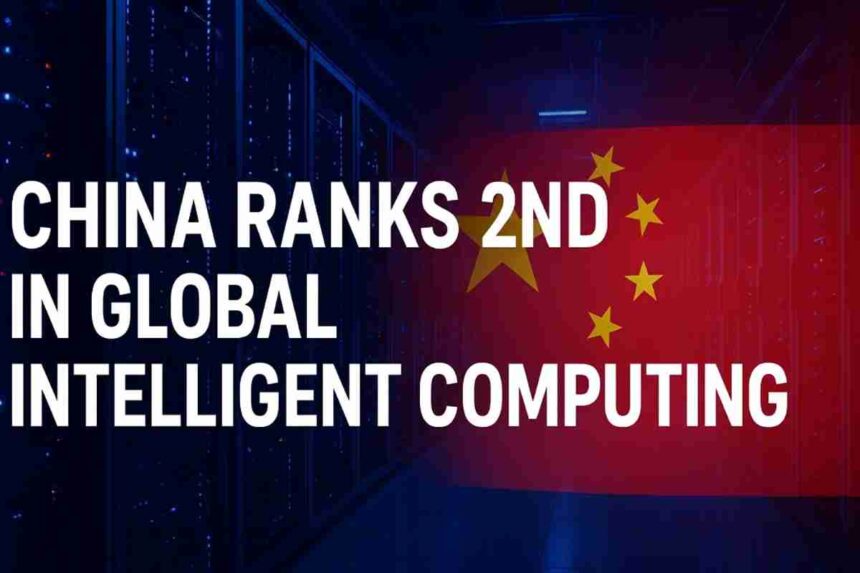China has officially secured the second spot worldwide in intelligent computing power, reaching 780,000 PFlops as of August 28, 2025. The announcement was made by Liu Liehong, head of the National Data Administration, during the China International Big Data Industry Expo held in Guiyang.
The milestone highlights China rapid rise in AI, cloud computing, and digital transformation, signaling a new phase in the global technology race.
What Is Driving China Computing Boom?
China climb in computing power is the result of strategic planning, AI adoption, and large-scale infrastructure investment. Three major factors stand out.
1. “East Data, West Computing” Strategy
At the core of China expansion is its “East Data, West Computing” initiative, which redistributes massive data workloads from eastern megacities to western provinces.
- The west offers cooler climates, lower energy costs, and cheaper land, making it ideal for giant data centers.
- Eight national computing hubs now generate over 60% of new computing power, with Guizhou province leading the charge.
- Guizhou has already built the world first 400G all-optical network computing channel, cementing its role as a national data hub.
This strategy ensures cost efficiency while preventing overburdening eastern cities with data demands.
2. Explosive Growth of AI Applications
China AI ecosystem is expanding at record speed. Forecasts suggest the country intelligent computing power will grow another 40% in 2025, surpassing 788 EFLOPS by mid-year.
Key industries driving this surge include:
- Healthcare – AI for medical imaging, diagnostics, and drug research.
- Smart Manufacturing – Predictive maintenance and automation.
- Autonomous Vehicles – Real-time traffic management with AI-powered navigation.
- Smart Cities – Data-driven urban planning and energy efficiency.
With more than 23,000 AI-focused projects already active, China is on track to become a global AI superpower.
3. Strong Digital Infrastructure
Behind the computing boom is a robust digital backbone:
- 4.55 million 5G base stations nationwide
- 226 million gigabit broadband users
This makes China one of the most connected countries in the world, enabling rapid deployment of AI models and real-time computing applications across sectors.
Why China Achievement Matters
China surge in computing capacity is not just about numbers—it carries global implications.
National Competitiveness
By securing the No. 2 spot, China demonstrates its growing dominance in AI and supercomputing, sending a strong signal to the global tech community.
Economic Growth
High-performance computing powers innovation across industries—from logistics to e-commerce—boosting China digital economy strategy and enhancing productivity nationwide.
Innovation Ecosystem
Supercomputing capacity enables breakthroughs in AI model training, cloud computing, and next-gen tech research, laying the foundation for a self-sustaining innovation ecosystem.
Challenges Ahead
Despite its progress, China faces key hurdles in maintaining momentum.
- Dependence on Core Technologies
China still relies heavily on imported semiconductors and enterprise software. Building self-reliance in chips and operating systems remains critical. - Efficiency vs. Capacity
While China total capacity is massive, efficiency lags behind the US. Optimizing software ecosystems, developer talent, and energy-efficient computing is vital. - Transparency Concerns
Many figures come from domestic benchmarks, making global comparisons uncertain. Greater openness will be required to validate its true place in the global computing hierarchy.
The Bigger Picture
China rapid climb to No. 2 in global intelligent computing reflects more than just technical progress—it underscores the nation’s ambitions in shaping the digital future.
With strategies like “East Data, West Computing”, accelerated AI adoption, and a booming 5G-driven infrastructure, China is building a powerful digital ecosystem. If it can reduce chip dependency and improve efficiency, China may even challenge the United States’ dominance in supercomputing in the near future.
For now, one thing is certain: China investment in intelligent computing is already transforming industries, boosting its economy, and reshaping its role in the global tech order.









